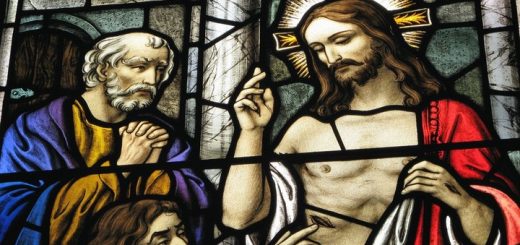Loved without condition. The message for LGBT+ people enclosed in the Gospel of Adultera (Jn 8, 1-11)
Reflections of Father Gregory Greiten* published on New Ways Ministry (United States) on April 6, 2025. Freely translated by the volunteers of the Gionata project
I still remember with extraordinary clarity a meeting that deeply marked my life: it was March 1992, and I participated in the third national symposium of New Ways Ministry On Catholic Church and LGBT+people. On that occasion I listened to Bishop Kenneth Untener, then Pastore of the diocese of Saginaw, in Michigan (United States). He spoke of the Gospel of Adultera - Just the song proclaimed on the fifth Sunday of Lent - with a lucidity and strength that I have never forgotten.
I remember say: «Jesus has never been too prudent in distributing his mercy. He was criticized for his "reckless" mercy towards sinners who did not deserve it ". Those words rooted inside me, especially while I was looking for the courage to fully and publicly embrace who they are: a gay priest in the Roman Catholic Church.
Bishop Unener spoke of inclusion, but even more emphasized what he himself considered the heart of the judgment of God: "As a theologian, I don't say it lightly, but I really believe that at the end of life the only thing that will count will be as we treated each other with each other". So simple, yet so deep. So difficult, but also deeply freely.
The Gospel of the adulterous woman is a story of disarming compassion. Jesus reveals himself for what he is: love that welcomes, who does not condemn, that saves. Yet - as Bishop Utener pointed us out - this page is missing in some ancient manuscripts of the Gospel of John. Perhaps some first Christians were troubled by a Jesus so excessively merciful? Maybe this scandalous mercy was too much to digest?
The scene is powerful. The Pharisees "take it in the act". "Bring" it in front of everyone. The "make it standing" in the center, alone. Three verbs that describe a domain exercised on the body and identity. They accuse him publicly, demanding the death sentence for stone, as the law established.
And of man? No trace. Once again, in a sexist society, it is the woman who pays. His accomplice - perhaps a Fariseo, a scribe, a merchant, a priest? - It has disappeared in the shadows, it is not accused, it is not judged. But I, and perhaps you too who read, can easily identify ourselves in that invisible man. Guilty yet unpunished. In silence, hidden, not appointed.
Instead, Jesus rises and places himself against arrogance, against the presumption of those who stand by judge. It is not left to trap, but with that phrase that has become legend - "Who of you is without sin, lash the stone first" - Disappear everything. There is no condemnation that comes from God. In those words the truth, justice, compassion is made.
One by one, they leave. And there remain in two. Sant'Agostino comments on this moment with a phrase that I love deeply: misera et mercy - "Misera and mercy".
Jesus looks at her and asks her: "Nobody condemned you?" – "Nobody, Lord" – "Neanch'io condemn you".
Those words not only free it from the judgment of others, but also from the weight that brings inside: shame, guilt, contempt for self, despair.
Many times I was asked: "How can Jesus not condemn sin?". But it is a misunderstanding. "Condemning" is not the opposite to "justify". The word condemns comes from Latin dammn, that is, consider someone without value, discarded. Its opposite is not to "excuse", but "save". It means restoring value, raising, returning to life.
Jesus and the Pharisees agreed: what that woman had done was wrong. But only the Pharisees condemn her. Jesus no. Jesus has never condemned any person. Never. And we, like his disciples, cannot do it. We can talk about the actions, of course. But the person? Never.
As a priest who has chosen to openly live his homosexuality, I know what it means to feel excluded, judged, hated. I know what it means to think, in the bottom of the heart, to be too wrong to be forgiven by God. Too many brothers and sisters LGBTQ+ carry this burden: going out on their own, unable to believe they are lovable.
And instead the prophet Isaiah tells us, in the first reading: "Don't remember the past things anymore ... Here, I do a new thing!"
God is doing something new. He did it for that woman. It does it for us. It does not condemn us. Not even in our darkest days. Not even when we ourselves deny ourselves. God never stops loving us. This is the truth. It is the only truth that matters.
In today's world, we LGBT+ people continue to undergo discrimination, violence, unjust laws. In many countries, transgender people in particular are the target of inhuman attacks and laws. Yet even in the midst of all this, the scandalous mercy of Jesus remains. What does not make calculations. What is not measured.
In this Lent, I invite you to enter this story. There is the face of God who seeks you, he sees you, he wants you. Let them speak to your wound, to that part of you who hide. Let me tell you: "Has anyone condemned you? I don't condemn you either. "
Being Christian is to live this meeting every day. Knowing that God's love does not end. It does not condemn us, but renews us. On Ash Wednesday he invited us to change his life and believe in the Gospel. And the Gospel is this: we are forgiven. Everyday. And the mercy of God is what makes us capable of changing.
As ministers and members of the people of God, we too must reflect that same "reckless" mercy that Jesus has embodied. In a world that divides, that hates, we cannot be silent. We will not let ourselves be condemned by the hatred of others.
We will not return to any wardrobe of shame. We will live. We will walk. And we will do it in the extraordinary, scandalous mercy of our Savior, who loves us to the end and renews our lives by recognizing an infinite dignity in each of us.
Let's accept ourselves. Let's love each other. Just as God created us: live, loved, embraced by a love that has no measure.
*Father Gregory Greiten is a Catholic Archdiocese priest of Milwaukee (United States). Since 2017 he has publicly lived his homosexuality as part of his ministry. He is currently parish priest administrator of the parishes of St. Bernadette, Our Lady of Good Hope and St. Catherine of Alexandria, all in Milwaukee.
Original text: Standing in The Space of Reckless Love






